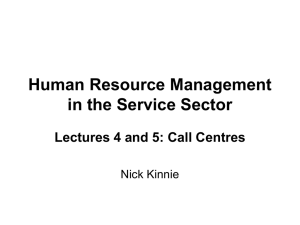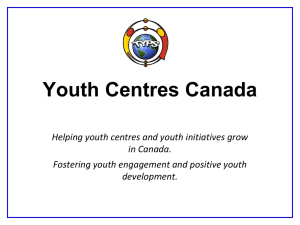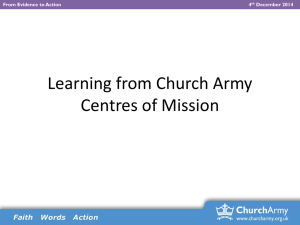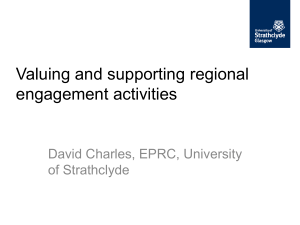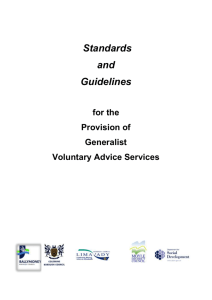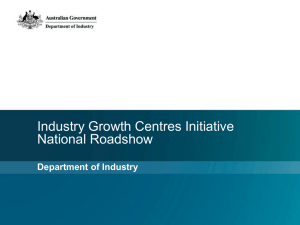DFE Guidance and OFSTED Changes
advertisement
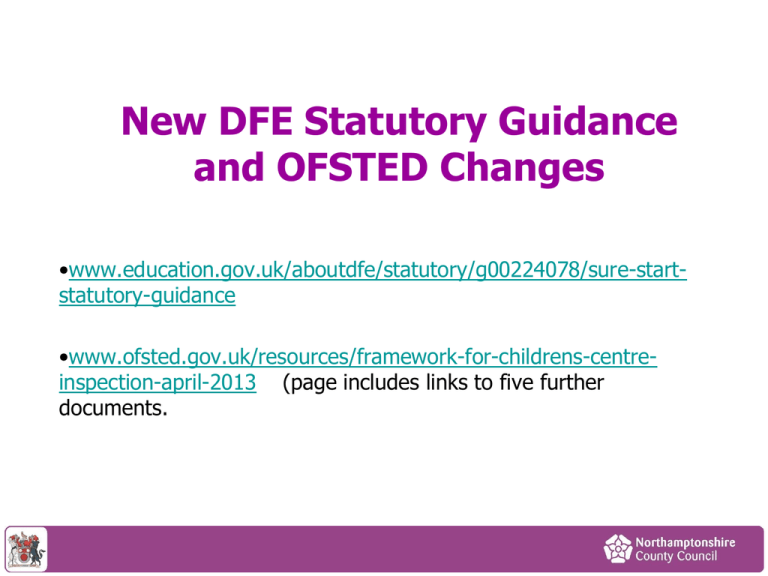
New DFE Statutory Guidance and OFSTED Changes •www.education.gov.uk/aboutdfe/statutory/g00224078/sure-startstatutory-guidance •www.ofsted.gov.uk/resources/framework-for-childrens-centreinspection-april-2013 (page includes links to five further documents. Sure Start children’s centres statutory guidance April 2013 • Replaces guidance published October 2010 • Statutory duties remain unchanged but there are changes to how they need to be delivered, incorporating latest thinking on outcomes for children and families and how integrated and partnership working will improve those outcomes Key points • clarifies what local authorities and statutory partners must do because it is required by legislation, and what local authorities and partners should do when fulfilling their statutory responsibilities • focuses on outcomes for children (the core purpose of children’s centres) • clarifies the duty to secure sufficient children’s centres accessible to all families with young children, and targeted evidence-based interventions for those families in greatest need of support • promotes the greater involvement of organisations in the running of children’s centres with a track record of supporting families Some key things to note • • • • • • Sure Start-On database – types of inspection Core Purpose unchanged since 2011 but now incorporated Sufficient Children’s Centres – presumption against closure Links with partner agencies Advisory Boards Safeguarding Changes to Ofsted framework • New framework published end of March 2013 and live from April 2013 • New SEF and guidance published April 2013 • Additional guidance expected May 2013 • Monitoring and support to bring about improvement in centres judged to ‘require improvement’ from September 2013. The case for change : Children's centres perform best when they: – have a detailed understanding of their local community – reach a high proportion of their target population – involve centre users in shaping and delivering services – have strong accountability and performance management systems – have high quality evidence - compelling information about the impact of the centre’s actions on children and families. Overview of key changes: • reduced set of judgements (from 20 to four) • introduction of a ‘requires improvement’ grade • mixed remit teams on every inspection to ensure coverage of centre provision • larger inspection teams and longer inspections for some types of inspection events • retention of an optional self-evaluation form • retention of up to three days notice of inspection • re-inspection of centres judged to ‘require improvement’. Changes to the way in which inspections are carried out • • • • • Simultaneous inspection of Centres within a collaboration Changes to pre-inspection planning Professional dialogue Joint observations Case studies New Self Evaluation Form • • • • Minimum amount of detail required to support your judgement Intended to be a summary of your much wider self evaluation work Should include carefully chosen evidence that demonstrates impact Refer closely to grade descriptors and give appropriate reasons for deciding an a grade Quality Improvement Programme Quality Improvement Programme Quality Improvement Programme Resources and Actions When New Ofsted Children’s Centre Inspection Framework 2013 Bespoke Ofsted Briefings on new Frameworks and SEF (2013) Phase 2 Centres completed Phase three centres planning in progress Quality Improvement Programme Quality Improvement Programme Resources and Actions When Quality and Improve Review New template developed based on a professional conversation regarding the operation, priorities, and Statutory duties of the Local Authority in relation to children’s centres EYFS /School Readiness Understanding EYFS data to inform practice and ensure school readiness Tracking children’s progress Phase two centres yet to be inspected completed Phase three centres planning in progress All centres to be completed phased approach. In planning stages with LSE Quality Improvement Programme Quality Resources and Actions Improvement Programme Quality Improvement Resources Revised Environmental Audit and Safeguarding Audit tools Children’s centre planning and measuring form for services and activities. Exercises for Children’s Centre teams on Outcomes (short medium and long), Impact and Inputs/outputs, and using data to inform services. Revised Advisory Board members workshop Template for SEF 2013 Timetable template for Ofsted Inspection 2013 Customer Satisfaction Survey template When On Children’s Centre Webpage and Children’s Centre ebulletin

